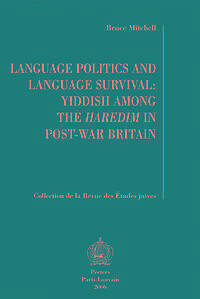
Bedankt voor het vertrouwen het afgelopen jaar! Om jou te bedanken bieden we GRATIS verzending (in België) aan op alles gedurende de hele maand januari.
- Afhalen na 1 uur in een winkel met voorraad
- In januari gratis thuislevering in België
- Ruim aanbod met 7 miljoen producten
Bedankt voor het vertrouwen het afgelopen jaar! Om jou te bedanken bieden we GRATIS verzending (in België) aan op alles gedurende de hele maand januari.
- Afhalen na 1 uur in een winkel met voorraad
- In januari gratis thuislevering in België
- Ruim aanbod met 7 miljoen producten
Zoeken
€ 132,45
+ 264 punten
Omschrijving
Language Politics and Language Survival: Yiddish among the haredim in post-war Britain outlines the history and development of the Yiddish language as it is used among Ultra-Orthodox Jews in contemporary Britain. The language policies of these communities are analysed and placed within the greater socio-historical and religious context of rabbinic justifications for the use of Jewish languages, and of Yiddish in particular. Reasons for the general abandonment of Yiddish outside of the haredi world are also summarized and placed in juxtaposition with the Yiddish language of loyalty of the haredim. Yiddish language and corpus planning in haredi schools is analysed using communal documents and newspaper articles, educational assessments of Jewish schools compiled by Her Majesty's Inspectors, a number of interviews with communal educators, tape recordings of lessons given in Yiddish, and observations made during my own visits to haredi educational institutions. A significant part of this book is dedicated to the analysis of the Yiddish language itself as it is currently used in Britain. The analysis of spoken Yiddish is based on recordings of speech patterns collected in the course of field work in haredi schools in London and Manchester and focuses primarily on dialectal usage based on religious sect and the geographic region within Britain. A brief sociological analysis of haredi literature in Yiddish is provided in order to demonstrate the ideological function of Yiddish language texts in contemporary Britain, and in the haredi world in general. The primary materials used for this are texts produced by, and published within, the haredi communities of Britain.
Specificaties
Betrokkenen
- Auteur(s):
- Uitgeverij:
Inhoud
- Aantal bladzijden:
- 176
- Taal:
- Engels
- Reeks:
Eigenschappen
- Productcode (EAN):
- 9789042917842
- Verschijningsdatum:
- 25/08/2006
- Uitvoering:
- Paperback
- Formaat:
- Trade paperback (VS)
- Gewicht:
- 339 g

Alleen bij Standaard Boekhandel
+ 264 punten op je klantenkaart van Standaard Boekhandel
Beoordelingen
We publiceren alleen reviews die voldoen aan de voorwaarden voor reviews. Bekijk onze voorwaarden voor reviews.









